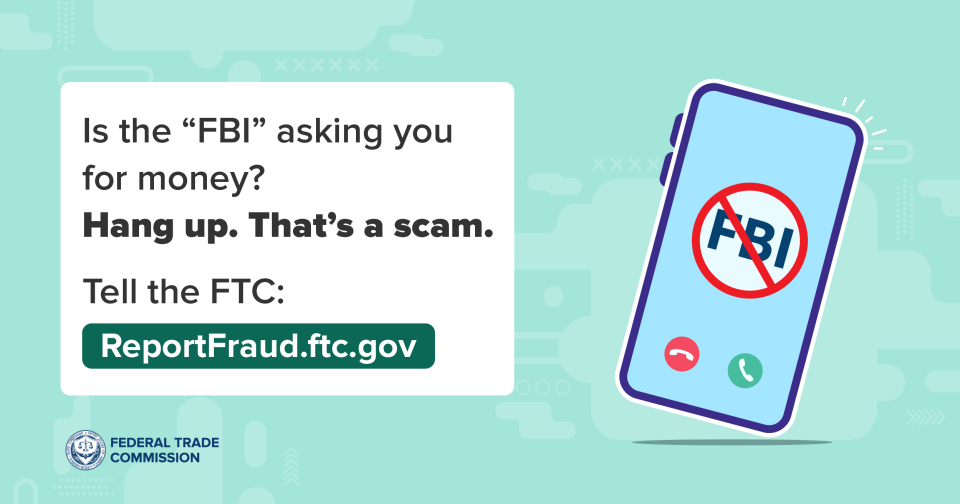Unwanted calls are annoying — but when a caller says they’re an FBI agent collecting on a legal judgment entered against you, it’s also scary. No matter how urgent and serious the call sounds, neither the judgment nor the agent are real. Like other impersonation scams, FBI imposters are after your money and personal information, and they might even threaten to arrest you unless you pay immediately. (Again: it’s not real.) Read on to learn to spot the scam.
Scammers will try to get you to act first and think later. If you get a call like this:
- Know that government agencies don’t call and demand money or personal information. Even if you owe money, real government representatives won’t call to threaten to arrest you, freeze your accounts, or take your property.
- Never pay anyone who tells you to pay with gift cards, cryptocurrency, or wire transfers. No government agency, including the FBI, demands payment that way. Anyone who does is a scammer. Always.
- Don’t trust caller ID. Scammers use technology to fake the number they call from. Never call back phone numbers from your caller ID or voicemails.
- Check with the FBI if you think the call or email is real. If you’re worried, contact one of the FBI field offices to check out the call.
Do you suspect an impersonation scam? Report it at ReportFraud.ftc.gov. Even if you didn’t lose money, your information helps investigators working to stop these scams.
Read more about the FTC’s rulemaking proposal to combat impersonation scams.


Ok..very useful and good information for everyone. Thank you very much.
Why is there no respect for these important bodies in Government?
In reply to Why is there no respect for… by Dorothy Sittler
Because there are ppl in government who abuse their power and are scamming. It's hard to know sometime.
In reply to Why is there no respect for… by Dorothy Sittler
Thanks
Can you check out if Steven D"Antuno BASED IN 601ST AND 4TH AVE WASHINGTON DCis a real FBI officer and email me back
HIS NAME WAS DISCOVERED BY MEON AN FBI WEB STE, HIS NAME PLUS THE NAMES OF4 0R 5 OTHER OFFICERS WERE PRINTED UP ON THE WEB PAGE
HEINVESTIGATEDACRIME WHERE 2 MEN MY ATTORNEY AT LAW ROY HAGEN AND MY BANKER AT CAPITEL TRUST BANK SORENSEN BRADFORD TYLER STOLE INHERITANCE MONEY 256 MILLION DOLLARS, BOTH OF WHO HE ARRESTED ANDD JAILED AND RECOVERED THE MONEY SO HE SAYS?? THEIR WAS ACOURT CASE WITH MERRICK GALAND ATTORNEY AT LAW WHICH 3.7 MILLION WAS RECOVEREDAND 152 FROM HAGEN BANK ACCOUNNT AND 102,2 MILLION FROM SORENSEN BRADFORD AND ITWAS SUPPOSEDTO BE TRANSFERRED TO MY BANK IN ALLIED IRISH BANK IRELAND LAST FRIDAY.THEN HE SDIDNT DO THE TRANSFER AND HASSTOPPED COMMUNICATING WITH ME
CAN YOU PLEASE GET A SENIOR FBI OFFICER IN 601ST TO CHECK HIM OUT IF HE IS A REAL OFFICER OR A FRAUDSTER?? THE COURTS SENTENCED THE 2 TO 2 YEARS AS GALAND MY ATTORNEY AT THE TRIAL DESPITE BEING INFORMED 20 TIMES IT WAS 256 MILLION STOLEN FAILED TO INFORM THE COURTS IT WAS 256 MILLION STOLE NOT 3.7 WHICH IS CRAZY IN ITSELF.CAN YOU PLEASE PLEASE FORWARD THIS ENTIRE MESSAGE TO A SENIOR OFFICER IN FBI OFFICED 601 AND 4TH AVE
KIND REGARDS
JAMES MOLONEY
Nice 👍
Two or three years ago I received a phone call from what I was told was the police department from my daughter's town, telling me that my grandson was under arrest for being in a car whose driver was also arrested for having drugs in his car, and that I could get him bailed if I gave them a gift card number. I hesitated, of course, but when they said I could speak to him, they put someone on the line that sounded just like my grandson. When he got on the line, he said, "Please don't tell my Mom or my Dad about this." When I asked him his dog's name, of course he couldn't tell me, so that confirmed my suspicions.
FBI is asking for payment and payment they say cash app is holding and they are threatening